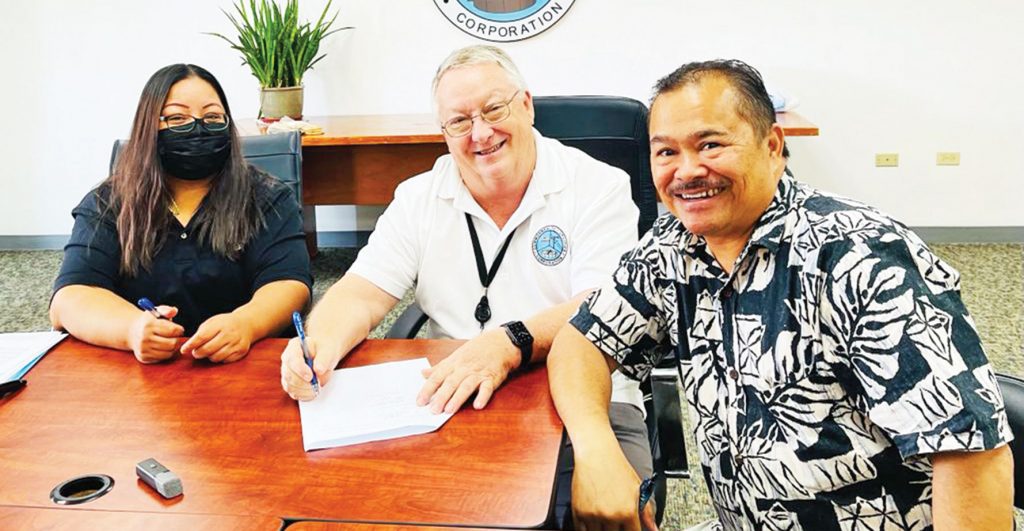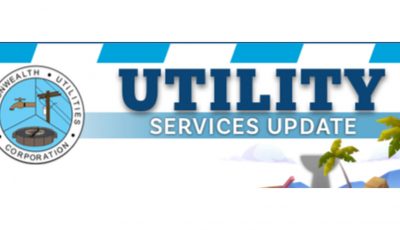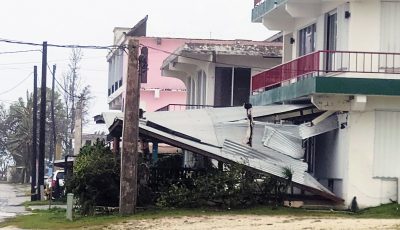Ada sets goal of 100% solar power for public schools
CUC board OKs CUC-PSS net metering MOA

Acting Commonwealth Utilities Corp. chief executive director William Gilmore signs the CUC-Public School System net metering policy of agreement yesterday at the CUC conference room. Also in the photo are CUC board chair Miranda V. Manglona and Education Commissioner Dr. Alfred Ada. (CONTRIBUTED CUC PHOTO)
The goal is for all public schools to use alternative renewable energy this coming school year—and the Public School System has set an ambitious target of 100% solar power by then.
PSS took a step in that direction yesterday when the Commonwealth Utilities Corp. board of directors approved a CUC-PSS net metering memorandum of agreement. CUC board chair Miranda Manglona presided over the board meeting.
Typically, what will happen is that PSS will install solar panels in all its schools and generate solar power for its use. Any excess power the schools produce will then be fed to CUC and the schools get a credit on the number of kilowatt-hours it sells CUC. If a school produces less electricity (like if it’s raining or cloudy), it will then buy electricity from CUC. In these instances, the school would pay for the electricity it uses, minus the credit from the excess electricity the solar panels earlier generated. Under this scheme, PSS estimates to reduce its CUC power bill by about $1 million; PSS currently pays about $2.2 million a year for power.
Education Commissioner Dr. Alfred Ada, who attended the CUC board meeting, said in an interview that he is pleased with the CUC board’s support.
“It’s been a long time coming. This is not just an educational but also an environmental issue,” Ada said, adding that he feels solar panels are the best direction for the CNMI.
He said the funding comes from both local and federal sources.
With CUC board’s approval of the MOA, Ada said PSS will probably have the groundbreaking for the solar panel project starting this month.
He said throughout the summer their goal is to try to get at least half of the schools retrofitted with solar panels. “So when we open in August, at least some schools will avail of that solar panels,” Ada said.
The commissioner said their goal is for all schools to have solar panels, but he cannot promise that.
“But I know that this coming year…is the restoration year for everything—infrastructure, curriculum, the academic—everything is trying to bring back normalcy,” he said.
Ada expects a lot of back and forth in coordinating with CUC to plan it so there will be fewer disruptions in the schools’ schedules.
PSS believes that it’s a win for PSS as the actual power produced by solar panels will have a lower cost than for the conventional diesel power that it sources from CUC.
PSS also feels that it’s a win for CUC because CUC can reduce the amount of fossil fuel-based power it is producing on sunny days when PSS generates its own power.
Board of Education member Andrew Orsini, who also attended the CUC board meeting, said in an interview that there’s some legal questions that require PSS to abide with Public Law 18-75, which provides exemptions for net metering for renewable energy for health and education entities in the CNMI.
“So right now, the [CUC] board of directors is going to discuss in an executive session to see how we can compromise to come to a good agreement before this agreement is signed actually by both parties because that’s required by law,” said Orsini before the executive session and the signing of the MOA.
CUC legal counsel assistant attorney general Jose Mafnas Jr. said in an interview that the MOA between PSS and CUC is in compliance with the law.
“PSS will be availing 100% of its net metering benefits,” said Mafnas before the signing of the MOA.
Mafnas said the CUC board recognized the need for this MOA so that PSS can install its solar system. He said the MOA also has a clause that allows the parties to amend the MOA if needed.
CUC and PSS signed the MOA yesterday afternoon.



























